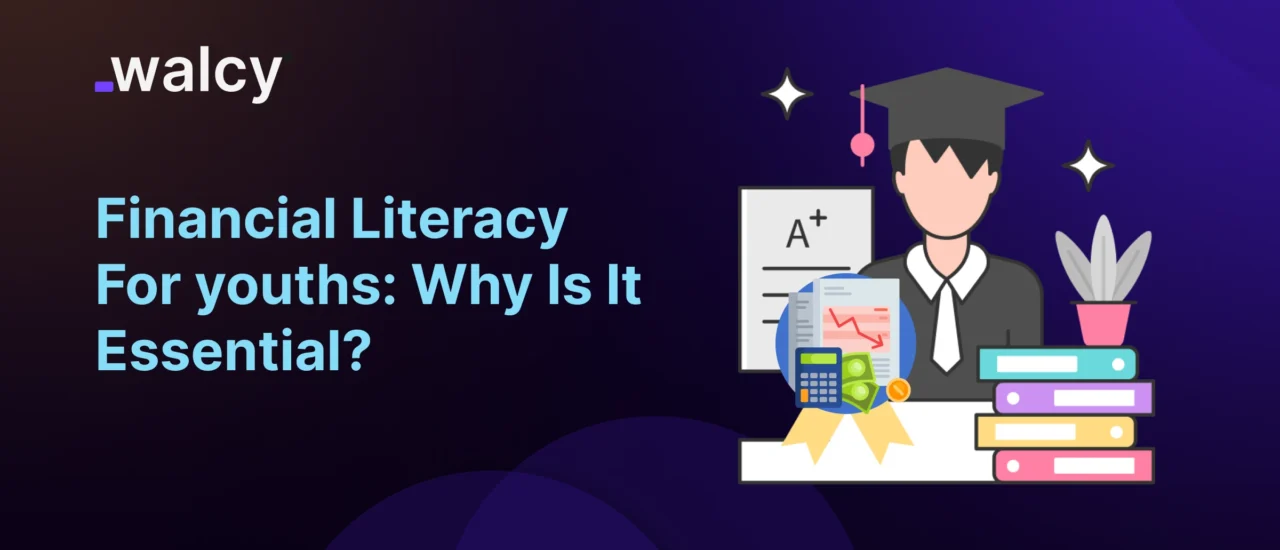It’s not enough to get by; young people must be financially smart. Teaching kids about money isn’t just one more thing to learn—it’s a must-have.
When they know how finances work, they can set themselves up for a secure future. It doesn’t matter if they learn in a classroom or from an app; getting them clued in helps them make good choices about cash.
If we focus on financial literacy for youths, these adults can then help the economy and live better lives. In our fast-moving world, knowing about money is super important for kids. Knowing how to handle cash can change their future.
Still, many teens start their adult lives without even the basics. This can lead to bad choices, debts, and constant money troubles. Many young adults open credit card accounts for the first time with absolutely no idea how credit card interest or credit scores work.
Others take out student loans without really understanding the payback plans. This article is all about why it’s so important to teach teens about finances, how it helps them, and how both old-school and new-school methods can help them become responsible with their cash.
What is Financial Literacy for Youths?
Being good with money, or financial literacy, is all about understanding some key things. This includes making a budget, saving, knowing how to invest, and keeping debt in check.
When young people learn about money early on, they’re more ready to make good money choices throughout their lives.
So, what exactly should young people know about money? Here’s a quick rundown:
Budgeting and saving: Figuring out how to make a budget and stick to it. Learning to save money is essential.
Understanding credit and loans: Grasping how credit cards and loans work, including interest rates and repayment terms.
Managing debt: Learning how to avoid debt and what to do if you are in debt.
Investment basics: Get an intro to investing, like stocks and bonds.
Digital payment systems: Understanding how digital payment apps and online banking work.
Long-term financial planning: Thinking about savings for the future, such as planning for retirement.
Tax management: Learning the basics of taxes and how they affect your income.
Understanding inflation and its effects on money.
Knowing how inflation makes things more expensive over time and how it affects your money. Becoming financially literate isn’t just about learning how to handle your cash.
It’s also about getting ready to deal with all the tricky money stuff that adults have to face. By learning about money now, young people can set themselves up for a more secure future.
They will be better equipped to handle things, and they can make informed decisions, which will make their lives less worrying.
Read about: 7 Effective Financial Management Tips For Entrepreneurs
Importance of Financial Literacy for Youths
Teaching young people about money isn’t just about dollars and cents; it’s about helping them get ready for a stable life.
Here’s why it matters:
- Start Good Money Habits Early
If teens learn about money early, it helps them form good habits.
When young people learn how to budget, save, and avoid debt, they tend to keep doing it as they age.
Research says that kids who learn to handle money when they’re young usually become adults who are good at managing their money.
They get why saving matters and learn how to spend smart.
- Keep Debt and Bad Spending Away
Without learning about money, many young people spend too much and depend on credit.
If youths are financially literate, they understand why it’s important to live within their means and handle debt wisely.
Credit cards with high interest, student loans, and personal loans can easily get young adults in trouble if they don’t know what they’re doing.
By understanding how debt works and how interest rates affect things, youths can avoid owing too much money.
- Get Youths to Save and Invest
Youths who know about money are more likely to start saving and investing early.
This helps them start building wealth and reach their long-term money goals.
Learning about savings accounts, different ways to invest like mutual funds, and how compound interest boosts savings can put youths on the road to being financially independent.
- Makes Youths Confident When Making Money Choices
Knowing things gives you power. When young people learn financial concepts, they feel better about making money decisions.
Whether it’s opening a savings account or investing, financial literacy helps youths control their wallets.
- Better Finances Later in Life
Good money habits that youths pick up can help them become more financially stable when they’re adults.
This means avoiding debt, saving for emergencies, and planning for retirement.
Financially stable adults are more likely to own homes, start companies, and help the economy.
The Role of Financial Education in Youth Development
Financial education plays a critical role in youth development.
It provides the tools and knowledge needed to navigate the financial challenges of adulthood.
Key areas that financial education should cover include:
- Budgeting and expense tracking
- The importance of saving for emergencies
- Understanding credit scores and their impact on future financial opportunities
- The basics of investing and wealth-building strategies
- How to avoid financial scams
- The importance of retirement planning from an early age
By learning these concepts early, youths can make more informed decisions and build a solid financial foundation.
Read about: Overview of the Indian Financial System
Traditional vs Modern Money Management for Youths
Financial literacy education should include both traditional and modern money management techniques.
Every strategy is essential to assisting young people in successfully managing their finances.
Traditional Money Management
Traditional money management methods are still relevant and provide a strong foundation for understanding basic financial principles.
These methods include:
- Budgeting using cash and notebooks
- Understanding bank accounts and savings accounts
- Basic knowledge of loans and interest rates
- Cash-based savings habits
- Envelope budgeting systems
Modern Money Management
With the rise of technology, modern money management tools have become essential for youths.
These tools provide convenience and better financial tracking. Modern methods include:
- Digital banking and mobile apps
- Cashless payment systems like debit cards and e-wallets
- Online investments and cryptocurrency basics
- Financial management apps like budgeting trackers
- Automatic savings apps
- Digital wallets like PayPal, Apple Pay, and Google Pay
By combining both approaches, youths can have a well-rounded understanding of money management in today’s digital world.
How Financial Literacy Helps Youths?
Financial literacy for youths empowers young people in many ways:
- Helps them avoid financial pitfalls like debt
- Encourages responsible spending and saving habits
- Provides knowledge on credit scores and how they impact future opportunities
- Prepares them for unexpected financial emergencies
- Teaches them how to plan for major life goals like education, travel, and homeownership
- Improves decision-making skills when choosing between wants and needs
- Encourages entrepreneurial thinking and side hustles
The Impact of Digital Transformation on Financial Literacy
The way young folks handle money has changed a lot because of the Internet.
Banking online, using digital wallets, and using investment apps make managing money easier than it used to be.
But it also means young people need to learn about handling their money online.
Knowing how to use online payment systems safely, spot scams, and make the most of money apps is super important for young people to be money-smart.
Financial Literacy and Mental Health
If you’re bad at managing money, it can cause worry and stress for young people.
But, if you know your stuff when it comes to money, it can make you feel better by taking away some of that money stress.
Teaching young people how to handle their money well doesn’t just help them be stable but also helps them feel better mentally.
Challenges in Teaching Financial Literacy to Youths
Despite its importance, teaching financial literacy to youths comes with its own set of challenges:
- Lack of financial education in schools
- Limited parental knowledge about financial literacy
- The rise of consumer culture and peer pressure
- Easy access to credit cards and online shopping
- Financial jargon that can be difficult for young people to understand
Addressing these challenges requires collaboration between schools, parents, and financial institutions.
Read about: Major Types of Payment Fraud and How to Avoid Them?
How To Improve Financial Literacy For Youths?
Improving financial literacy for youths requires a multi-faceted approach. Here are some effective strategies:
- Integrate Financial Education in Schools
Schools should incorporate financial education into their curriculum to ensure all students receive basic money management skills. This can be done through dedicated finance classes or by integrating financial topics into subjects like mathematics and economics.
- Parental Guidance
When it comes to teaching kids about money, parents are extremely important.
Simple lessons like setting a weekly budget, saving for a toy, or understanding the value of money can have a long-lasting impact.
- Financial Literacy Apps
You can find several apps online that help youths learn budgeting, saving, and expense tracking in a fun and interactive way.
- Community Programs
Community-based financial literacy programs can provide workshops and mentoring sessions to help youths improve their financial skills.
- Online Resources and Courses
Many free online platforms offer financial literacy courses that youths can access at their convenience.
Conclusion
It’s key for young folks to get a grip on money matters. It’s not just a neat skill, it’s a must-have. If they get the basics of finance early, they can build a stronger future.
These days, there are tons of ways to learn about money. They could do it the old-school way, like with a class or a book. Or, they can try online stuff and apps, which can be pretty useful and fun.
However, they decide to learn; teaching young people about money helps them make smarter choices. They’ll figure out how to save, spend, and invest the right way.
If we focus on teaching teenagers about money, we’re helping them grow into financially smart adults.
They’ll be able to support themselves and their families. Also, they’ll be able to contribute more to the economy.
When people handle their money well, they tend to be more stable and secure, which makes life better. So, it’s putting money into their future and our communities too.
Do follow us on Facebook and LinkedIn, to stay connected with us.



